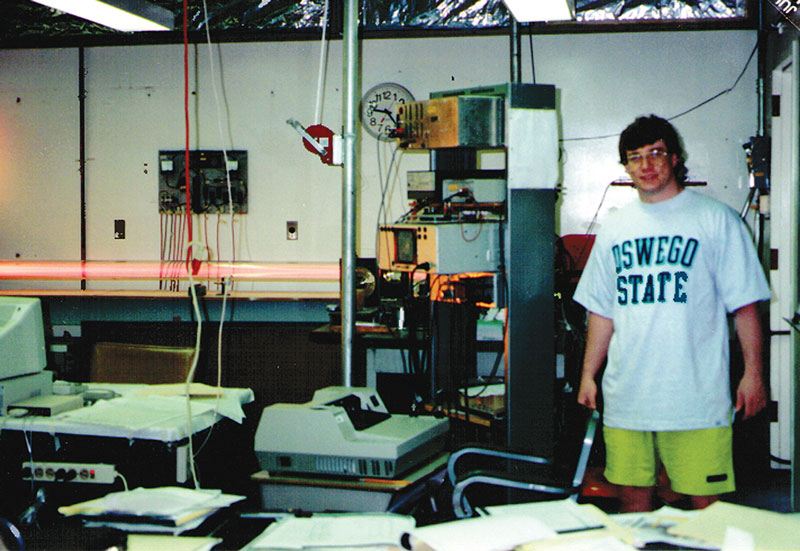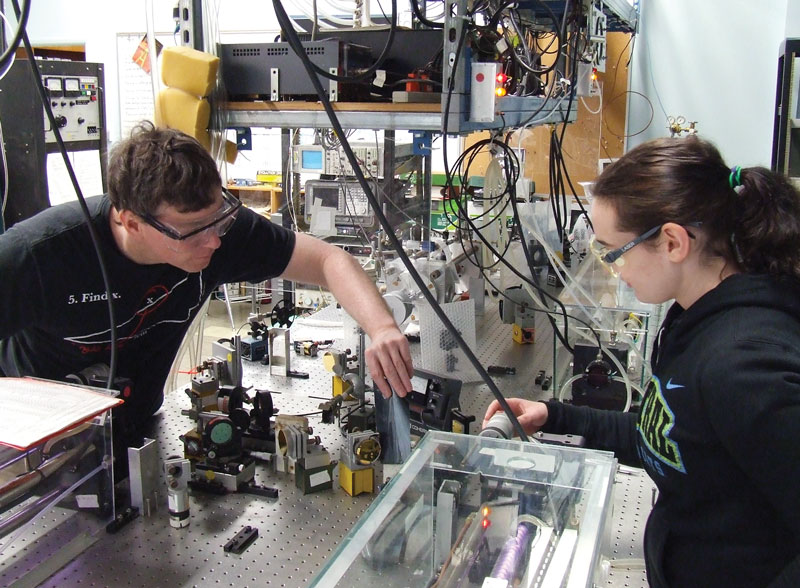My First Research Experience
Spring
2015
Pathways - Advice from Experienced Voices
My First Research Experience
The most transformative element of my undergraduate education
By:Michael Jackson, Professor of Physics, Central Washington University, Ellensburg; Physics and Astronomy Division Chair, Council on Undergraduate Research
Central Washington University

Without a doubt, the summer of 1990 was the most transformative, influential, and memorable period of my undergraduate education. It was the summer after my second year in college; the summer I got my start in research.
During my sophomore year I had been having doubts about my academic trajectory. I was performing reasonably well in my physics classes at the State University of New York at Oswego, nestled on the shores of Lake Ontario. But I had come away from my courses feeling that I could not apply what I had learned to anything.
A summer with Sudha
As a result, I wanted to test my abilities in physics outside the classroom environment, in a lab. The question was how? I went to those I trusted most; I knocked on the doors of the physics faculty, one by one. No one I knew had any research opportunities for me, but they all recommended a faculty member whose office was at the end of the hall that I passed daily, Dr. G. R. Sudhakaran (Sudha).
I had not interacted with Sudha prior to that time, and I knew nothing about him. So it was with apprehension that I approached his office, provided him with some background information about myself, and asked if he had any research opportunities open to students during the summer. He told me to stop by the following week. I was in!
That summer my research experience focused on using a hydrogen cyanide laser and analyzing Stark spectra for methanol and its isotopologues. Sudha was a fabulous mentor. I was exposed to his research methodology, the challenges he faced, and his ways of dealing with unexpected problems. He told me stories of his time in graduate school and what life was like where he grew up in India—stories that I sometimes tell my students today. He even invited me to his home to share the joy of Indian cuisine.
The lasting impact of research
Fortunately, I was able to continue working with Sudha for the remainder of my undergraduate education. He would become my PhD advisor and, eventually, my department chair when I held a faculty position at the University of Wisconsin–La Crosse. We have published nine papers together over the years, two of which came from my time as an undergraduate in his research lab.
During my undergraduate research experience, I learned how to abide by the principles of working in a lab, ask the right kind of questions, and deal with seemingly insurmountable problems that had no obvious solutions. The experience gave me the confidence later on to propose and develop my PhD dissertation topic. I was able to convey why my research needed to be funded and establish collaborations with world-renowned scientists at the University of Oxford and the National Institute of Standards and Technology. I am uncertain what else in my education could have allowed me to develop the skills to accomplish these and many other activities.
Taking the plunge

Valuable research experience can come in many forms and take place during the summer or the academic year. You might find a research position or internship, doing a project that you formulate or one that is assigned to you. The end result of your labors may be a final report, a presentation, or, if you are extremely lucky, a manuscript submitted for publication. At this point in your education, the key is to focus on exploring what interests you and as well as learning what you do not enjoy doing (which can sometimes be even more important).
Be sure to consider both on-campus and off-campus research opportunities in physics. The Research Experiences for Undergraduates program, funded by the National Science Foundation, provides summer research opportunities. National laboratories, private sector companies, and nonprofit organizations such as the Society of Physics Students offer research experiences as well. A great place to search from among many different kinds of summer research opportunities is the SPS Jobs site.
You may also be interested in research opportunities at your school in disciplines related to physics that pique your interest, such as biology, chemistry, geology, mathematics, engineering, and beyond. Society’s problems are seldom confined to one field. As a physicist you can bring a unique skill set to research groups in other fields, from which you will undoubtedly gain both content knowledge and skills that can help you function in an interdisciplinary setting.
How many positions should you apply for? Identifying at least six is a good start. Because many programs are competitive, applying for several enhances your chances of getting an offer. Had I not kept knocking on faculty doors, I may never have had the opportunity to work with Sudha.
If you get an opportunity, take full advantage of it. Be prepared to work through concepts on your own as well as with mentor guidance. Talk to your mentor about developing a presentation that you could give at a conference on your home campus, a regional professional meeting (like an SPS zone meeting), or a national conference such as the National Conference on Undergraduate Research (NCUR). Presentations are not only great resume builders but also great opportunities to convey science to your peers.
In collaboration with your mentor, you might also consider developing a written summary of your work, an internal report, or a publication. Scientific writing is rarely taught and yet it is one of the most important skills we expect from the community. See page 22 for tips on writing about your research.
Don’t be disappointed if your opportunity consists of working under the supervision of a postdoc or a graduate student instead of a faculty member or full-time researcher. Take advantage of this option, which can provide you with a better understanding of what one actually does in graduate school and what it takes to succeed.
Finally, don’t take rejection personally. There are a lot of factors that go into selecting students for research opportunities, many of which go beyond your formal academic training. Since it is hard to predict if you will be selected, I recommend taking an optimistic approach and applying for every opportunity that really interests you. You will never be selected if you do not apply.
The bottom line: Find a way to get involved! In most cases, no one will come to you with opportunities. You will need to take the first steps. Take the plunge! //
FIND YOUR RESEARCH EXPERIENCE
Check out SPS internship opportunities at www.spsnational.org/programs/internships.
Search for opportunities at SPS Jobs at http://jobs.spsnational.org.
Find an REU at www.nsf.gov/crssprgm/reu/reu_search.jsp.
Land a NIST internship at www.nist.gov/surf.
Apply to NASA at https://intern.nasa.gov.
Check out DOE positions at http://energy.gov/student-programs-and-internships.
